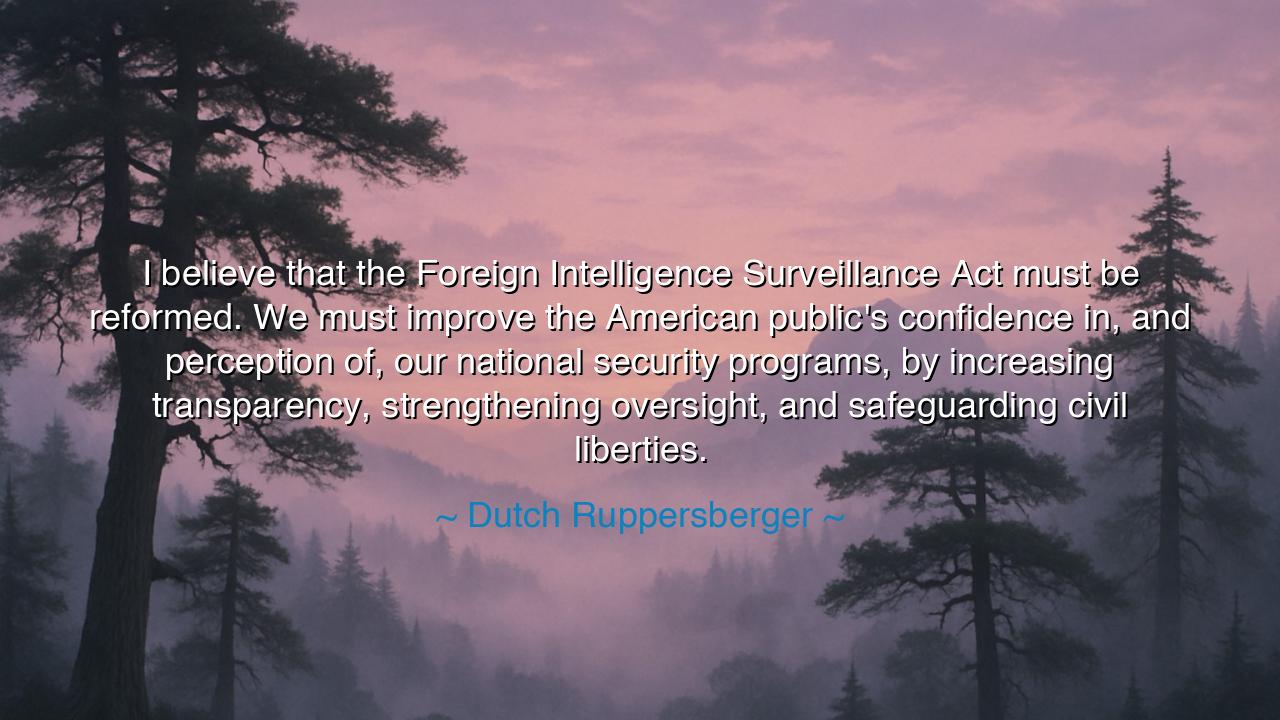
I believe that the Foreign Intelligence Surveillance Act must be
I believe that the Foreign Intelligence Surveillance Act must be reformed. We must improve the American public's confidence in, and perception of, our national security programs, by increasing transparency, strengthening oversight, and safeguarding civil liberties.






Hearken, children of the republic and of the world, to the words of Dutch Ruppersberger, a voice calling through the corridors of governance and conscience: “I believe that the Foreign Intelligence Surveillance Act must be reformed. We must improve the American public’s confidence in, and perception of, our national security programs, by increasing transparency, strengthening oversight, and safeguarding civil liberties.” In these words lies both a recognition of imperfection and a summons to courage, for the balance between security and freedom has always been the crucible of human civilization.
Long have empires wrestled with the tension between safety and liberty. In the days of Athens, the leaders of the city debated fiercely whether to empower their protectors at the cost of the freedom of citizens. In Rome, spies and informants monitored the populace, sometimes defending the state, sometimes betraying the very virtues they sought to preserve. The wisdom of the ancients teaches that security without accountability becomes oppression, and liberty without vigilance becomes chaos. Ruppersberger’s call for reform echoes this eternal truth: to guard the people, one must also honor them.
The Foreign Intelligence Surveillance Act (FISA), born in the cold dawn of the modern age, was designed to give the guardians of the nation tools to protect against unseen threats. Yet even the strongest shield can cast a shadow, and when oversight falters, suspicion festers. History reminds us of the perils of unchecked power: consider the excesses of secret police in authoritarian regimes, where security was used to suppress rather than protect. Transparency and oversight, Ruppersberger urges, are the twin lights that illuminate the path of righteous governance, ensuring that vigilance does not become tyranny.
The importance of public confidence cannot be overstated. A people who trust their protectors are a people unshaken by fear; a people who doubt them are divided and vulnerable. In the modern age, when whispers travel across networks and news spreads in an instant, confidence is the currency of legitimacy. Just as a fortress stands only when its citizens believe in its walls, so too does a nation stand only when its people perceive its guardians as just and accountable. Reform, therefore, is not mere administration; it is the restoration of faith between ruler and citizen.
History offers a mirror: after the revelations of the Church Committee in the 1970s, which uncovered abuses of intelligence agencies in the United States, reforms followed that strengthened oversight and restored some measure of trust. This was a moment when civil liberties were remembered not as obstacles but as guiding stars. Ruppersberger’s words summon the same spirit: the work of the guardians must always be aligned with the principles of the governed, for without such alignment, security becomes an empty shell.
Let this teaching extend beyond governance, to the life of every individual. The balance between vigilance and respect, between protection and freedom, is a lesson in moderation and foresight. We must guard our own lives, our own communities, with diligence, yet never surrender the virtues that make such vigilance honorable. Oversight and reflection are not merely civic duties; they are moral imperatives, ensuring that power serves the many rather than the few.
From this wisdom flows practical counsel. Demand transparency in the institutions that watch over you. Advocate for oversight that is independent, thorough, and courageous. Cherish civil liberties as treasures that must be defended with the same vigor as the nation itself. By doing so, the people honor both themselves and the state, forging a harmony between freedom and security that endures across generations.
Finally, remember that reform is not the act of one alone, but the work of a vigilant and conscious people. Ruppersberger’s call is thus a call to action, a reminder that the strength of a nation lies in the fidelity of its principles, the courage of its citizens, and the wisdom to balance power with accountability. Guard what is sacred, act with discernment, and let justice and liberty be the twin pillars upon which the fortress of society rests.
If you wish, I can also craft a poetic, rhythmic version of this explanation, designed for oral narration or motivational reflection, to bring the essence of Ruppersberger’s teaching vividly to life. Do you want me to do that?






AAdministratorAdministrator
Welcome, honored guests. Please leave a comment, we will respond soon